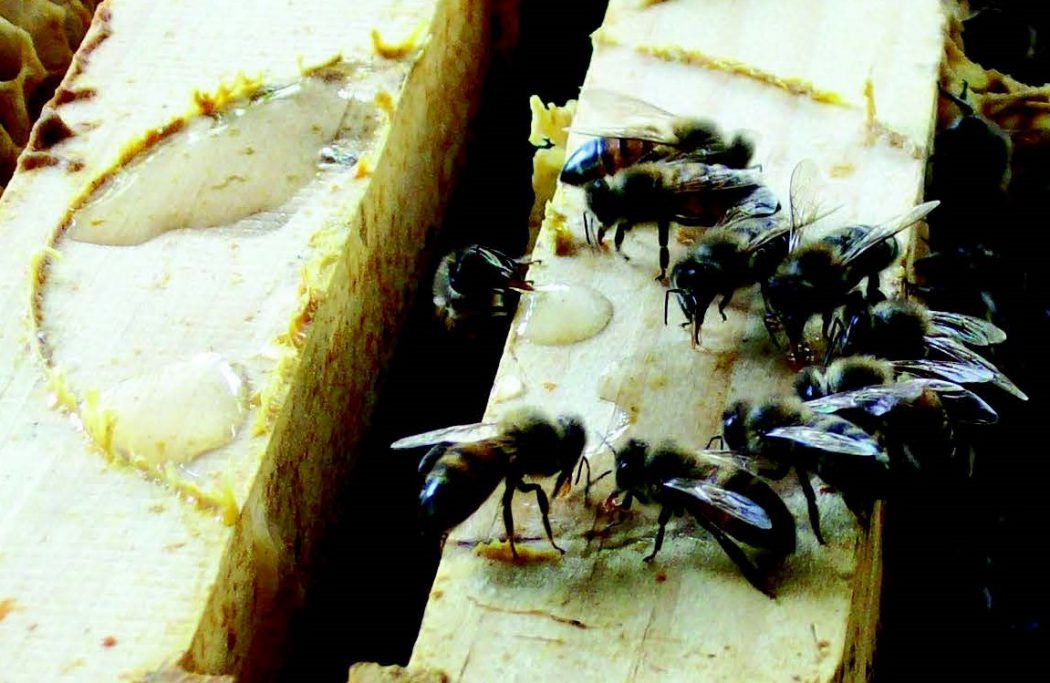By: Apis Mellifera
Introduction
The history of beekeeping is filled with observations that have led to many efficiencies in the human manipulation of honey bee colonies. The welfare of their insect charges, however, has not often been a focus of beekeepers. This series of letters is being published here by we insects (Apis mellifera), therefore, addressing the beekeeping public, in an effort to increase the sensibilities of our human managers.
I, as recorder for the board of directors of the honey bee colony, have taken pen in hand to write concerning our thoughts about so-called modern bee culture. Collectively, we are concerned about the current status of the beekeeper-honey bee relationship and as such, would like to give a honey bee’s-eye view of the situation.
You may be somewhat surprised to know a honey bee can write. I can’t in human terms, but my letters are being faithfully copied by our beekeeper, a kind and gentle soul, who understands our language. He talks to us each day about worldly affairs, reads us the latest good as well as gibberish in the beekeeping publications, and generally keeps us informed of the human community’s ideas about bee culture.
You may also wonder where much of our information comes from, emanating as it is from individuals who live relatively short lives. Honey bees, after all, have no books nor libraries to house information. With what audacity, therefore, do we insects suggest to counsel humans who’re supplied with huge arsenals of scientific knowledge. Our collective knowledge is not in print, but lies in molecules, evolving over the years into wonderfully limitless configurations, providing more than the number of required permutations to store honey bee experience as it has developed over time. You humans must remember that our species is infinitely more ancient than yourselves, being in development perhaps tens of millions of years to your paltry two or so.
These preliminaries concluded, let me get to the first agenda item the board has asked me to address. We are much concerned about the smugness of some beekeepers today. They are constantly jawing in the journals about specific and simple answers to our problems. We are a complex society and pride ourselves as such. We suggest humans don’t be misled by those who insist there’s only one way or one time to do things. That is simply not the case in most instances. And woe betide we bees with a keeper who thinks so.
Often we are doomed to deal with exasperating circumstances put upon us by unthinking beekeepers that are hopelessly out of synchrony with our biology and that of the plants we depend upon. Sometimes these improperly-timed techniques result in the extinction of a colony, a loss to you and us alike. Most result from the consequences of a quote in the movies some time ago: “What we have here is a failure to communicate.”
We abhor this lack of communication, and through these letters hope to overcome the resulting barrier. Some of what we say will be controversial even among our own members. Much will perhaps be offensive to beekeepers, but it appears to be the only way we can tell our story as it is, rather than have it thoughtlessly and carelessly told for us.
It is fortunate that a couple of recent publications have cast aside the mantle we will be revealing in this series of communications. Dr. Mark Winston is the recipient of the 2015 Governor General’s Literary Award for Nonfiction for his book Bee Time: Lessons From the Hive. One of the world’s leading experts on bees and pollination, Dr. Winston is also an internationally recognized researcher, teacher and writer. He directed Simon Fraser University’s Centre for Dialogue for 12 years, where he founded the Centre’s Semester in Dialogue, a program that creates leadership development opportunities that equip and empower students to contribute to social change in communities.
The prologue to Bee Time reveals Dr. Winston’s reply to a journalist asking whether bees and dialogue were connected or might have anything in common: “Absolutely,” he responded: “Initiating a dialogue requires the same attention as entering an apiary. Both stimulate a state of deep listening, engage all the senses; hearing without judging.
“Through dialogue, time slows down, as it does in apiaries. Focus sharpens on how participants are interacting. Understandings emerge, issues clarify and become connected, and collaboration surfaces from the intentions and actions of many individuals. Solitary becomes communal.
“Dialogue has that apiary feeling, reading situations and discerning what there is to learn from each unique constellation of persons, circumstances, and issues. Those too-rare moments of presence and awareness, when human interactions are realized; they, too, are bee time.” We couldn’t agree more.
Dr. Thomas Dyer Seeley is the Horace White Professor in Biology in the Department of Neurobiology and Behavior at Cornell University. He is the author of several books on honey bee behavior, including Honeybee Democracy (2010) and The Wisdom of the Hive (1995). His most recent book we see as a masterful treatment of our biology and behavior, The Lives of Bees: The Untold Story of the Honey Bee in the Wild. We applaud Dr. Selley’s efforts to “review what has been learned about how colonies of honey bees live in their natural world.”
It is refreshing to have it be recounted how we free-living honey bees residing in tree cavities and rock crevices lead lives substantially different from those managed by beekeepers in white boxes jam-packed together into apiaries in apple orchards, blueberry fields or nestled in back yards. From insights developed through ingenious experiments, Dr. Seeley communicates to readers a fundamental truth. “Wild honey bee colonies are surviving and maintaining their numbers, while at the same time some 40 percent of beekeeper-managed colonies are dying each year.”
On Controversy
There’s been an alarming lack of controversy lately in the beekeeping journals. This makes for dull reading, and in the long run, little thinking. Some of our own board members even went to sleep while our beekeeper read one of the latest articles in a nationally-recognized publication.
One of the charms of the bee journals throughout history has been the differences of opinions expressed in their pages. True, this has led to some animosity, but we believe in the long run it has added to the average beekeeper’s knowledge, and ultimately helped us bees. This recent lackadaisical state of affairs appears to be caused by a complacency developed over time by beekeepers because they’ve had it too good. Perhaps this attitude is justified. After all, why should a beekeeper have to do any work? He can sit back and rely on federal and state-subsidized research and education to do the investigating and thinking for him.
Note our use of the loaded word “him.” We choose to use it here, knowing full well that most of us are in fact females, who are far more capable of running things in most cases than males in our society. This use is a compromise to increase readership and hopefully comprehension. Given that most human males seem to be wedded to their reputation as innate leaders and thinkers, they may well pay less attention to these letters when written by females, to their and our detriment.
The direct support noted above, along with financial resources, can in some instances bail humans out of the consequences of their beekeeping errors. This is not to our advantage since we bear the brunt of the errors often with no recourse to correct them. And in the end, the results, rather like Banquo’s ghost, come back to haunt beekeepers and honey bees alike. There can be no substitute in our opinion for the average beekeeper to read as much as possible, mull over the information, talk to other beekeepers, and then act according to best-informed instincts to help us bees in times of crisis.
We are hardy creatures as noted by Dr. Selley in The Lives of Bees. As one of us stated in a recent communication: “We’d have to be tough to weather the storms foisted on us for decades by unthinking and uninformed beekeepers.” We can and do endure many beekeeper mistakes, but this is taken in stride with the hope that each leads to a learning experience trusting that humans will begin to get a perspective on our complex lives. However, this only happens through much effort and study. Differences of opinion, based on independent investigation, and thought, should be cultivated, so each beekeeper can find their own way to effectively think more like a honey bee.
In conclusion, the recent lack of robust controversy in the bee journals is an ominous sign that beekeepers may be becoming lazy and or are simply not thinking for themselves. We are hurt by this malaise, more so perhaps than having our honey stolen, in the belief that beekeeping is somehow a “free lunch.” We urge, therefore, a return to constructive controversy by beekeepers. Only by discussing and thinking out beekeeping problems based on a diversified information base, will both bees and beekeepers have much hope of prospering in the future.









